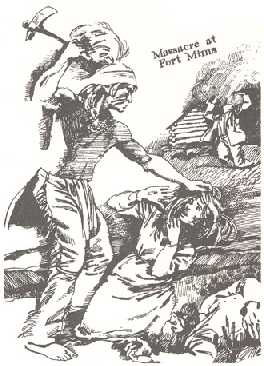 Another Stereotype of the Month entry:
Another Stereotype of the Month entry:
 Another Stereotype of the Month entry:
Another Stereotype of the Month entry:
From Denver's ABC Channel 7 News, 9/19/03:
Headline In Campus Newspaper Angers American Indians
Editors Apologize For 'Scalp' Reference
POSTED: 1:54 p.m. MDT September 19, 2003
GRAND JUNCTION, Colo. — A sports headline in the Mesa State College student newspaper has angered American Indian students and led to an apology.
The Criterion story was about last Saturday's Mesa State victory over the University of North Dakota's Fighting Sioux football team.
The headline read "Mavs scalp Sioux 31-24."
The headline dismayed the president of the Native American Student Council at Mesa State.
Cy Blackhorn and his wife, Gayla, are from the Pine Ridge Sioux reservation in South Dakota.
Newspaper staff apologized for the headline and said it was a mistake.
The Indian students said the mishap does provide an opportunity to educate the public about their heritage.
Copyright 2003 by The Associated Press. All rights reserved. This material may not be published, broadcast, rewritten or redistributed.
Article Published: Tuesday, September 30, 2003
'Scalp' headline stirs Mesa State
By Nancy Lofholm
Denver Post Western Slope Bureau
GRAND JUNCTION -- When a "Mavs Scalp Sioux 31-24" headline set off shock waves at Mesa State College two weeks ago, Gayla and Cy Black Horn coincidentally were sitting in a tepee they had erected in the middle of the campus to bring attention to their heritage.
The two Lakota Indian students from the Pine Ridge Reservation in South Dakota read the inch-high headline in their campus newspaper, the Criterion, and immediately struck their tepee and left.
"This really hurt my heart," said Gayla Black Horn, a sophomore business major.
The Black Horns' continuing upset, and the offense others have taken at the headline about a Mesa Mavericks football victory over the University of South Dakota Fighting Sioux, has resulted in a spreading controversy.
The faculty adviser to the student newspaper has resigned. The Cultural Diversity Board has suffered a split between offended students and those who think they are being too sensitive. A Native American professor has received an ugly letter stating that she should be "tomahawk-chopped in the head." And a college working to put color into a largely white student body and teaching staff has suffered something of a setback.
"It's another bump on the highway of life," said Sam Gingerich, interim president of Mesa State College who has vowed to use the "scalp" controversy to promote more cultural awareness.

The headline matter has not faded away at Mesa State, where about 15 percent of the student body is minority and 75 of 5,500 students claim Native American heritage, because Gayla Black Horn and some other members of the Cultural Diversity Board say they did not receive a proper apology.
"I thought it (the headline) was real disrespectful of a people and a way of life. But this all could have been somewhat resolved if they had just apologized," said Duane Butler, secretary/treasurer of the diversity board.
The weekly Criterion ran a front-page apology for the "unfortunate mistake." But sports editor Austin Brock, who wrote the headline, and Criterion faculty adviser Dr. Morris Brown wrote letters to the editor explaining their position without apologizing.
Brown, a professor who is black, stuck up for the Criterion staff saying that even though the use of the word "scalp" might not have been politically correct, he did not believe the headline writer meant it in a derogatory way.
He invited critics of the paper to come to the Criterion office and try to do a better job.
A weeping Gayla Black Horn said she wondered how Brown would respond to a headline derogatory to blacks.
Brown resigned the same day that paper came out after he was slammed by student criticism that his letter only made things worse.
Brock, in his letter, cited a TV news poll that found 55 percent of respondents thought Native Americans were being too sensitive about the issue.
Brock said he was caught up in the euphoria of the football victory and meant no offense. He said that as a former football player, terms such as "scalp," and common sports headline material such as "massacre" and "crush" are often used by team members to get pumped up for games.
"I was completely flabbergasted. I saw it as a creative way to exalt our football team," Brock said.
The Cultural Diversity Board and the Native American Student Council have not taken formal stands backing the Black Horns and others still upset over the headline. And that has caused more upset and rifts within the organization. Gayla Black Horn said she is considering resigning from the board and council because some are criticizing her for being overly sensitive.
"I think political correctness can go overboard," said Errol Nevers, a black student.
Criterion Editor Natalie Gaffey is taking the blame for the whole mess. She said she simply missed the headline, which would not have run if she had seen it.
"Words are so powerful," said Gaffey, who has weathered so much criticism that she said she is no longer considering journalism as a career.
Gaffey has invited readers to sound off on the issue in two to three pages of letters to the editor she plans to run Wednesday. Normally, the paper has a single page of letters.
VIEWPOINT: Nickname incidents will continue until UND drops 'Fighting Sioux'
By James McKenzie
What happened in the Colorado newspaper is not an ugly "incident." It is a manifestation of an abiding ethical and moral problem at the core of North Dakota's system of higher education. It is a moral problem because the dominant culture appropriates for itself the name and sacred symbols of a protesting minority culture. It is an ethical problem because of the manner in which the "decision" to keep the name was made.
Rob's comment
That Brock didn't intend the headline to be derogatory or harmful doesn't mean it wasn't. People who say or do derogatory or harmful things often don't mean them—at least not consciously.
Related links
Team names and mascots
Savage Indians
|
. . . |

|
All material © copyright its original owners, except where noted.
Original text and pictures © copyright 2007 by Robert Schmidt.
Copyrighted material is posted under the Fair Use provision of the Copyright Act,
which allows copying for nonprofit educational uses including criticism and commentary.
Comments sent to the publisher become the property of Blue Corn Comics
and may be used in other postings without permission.